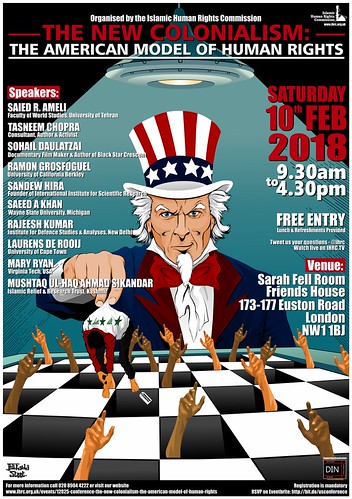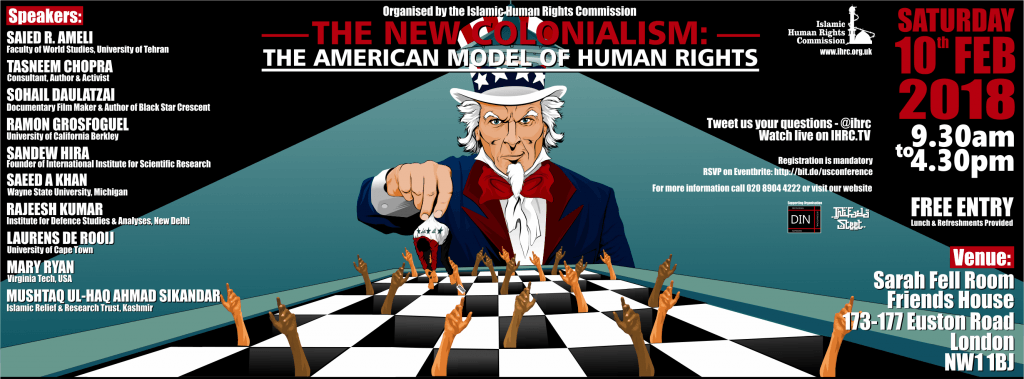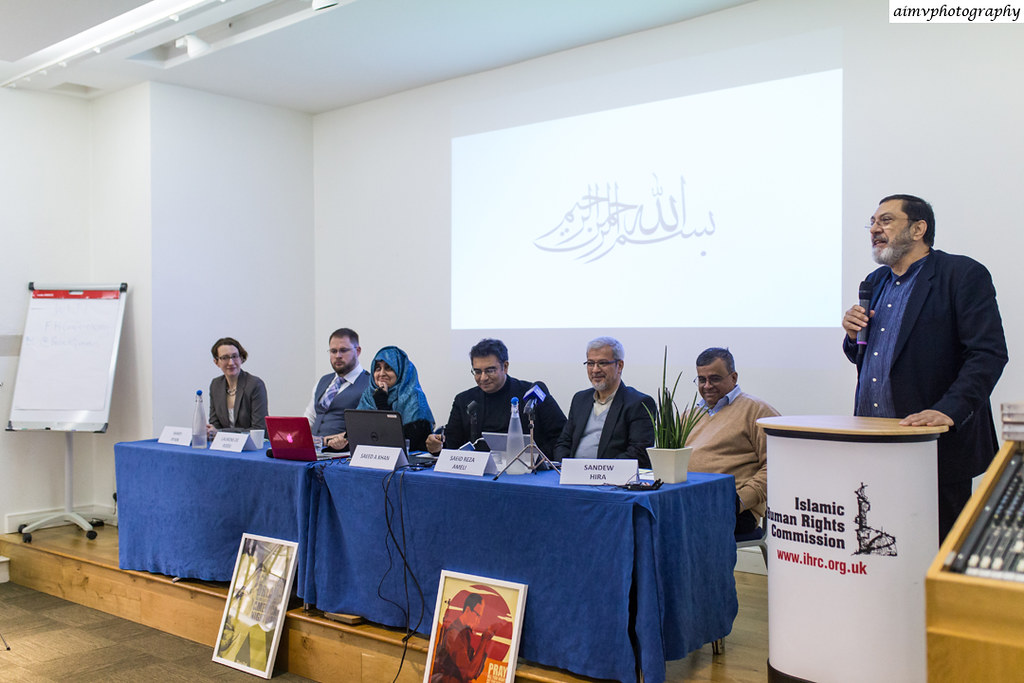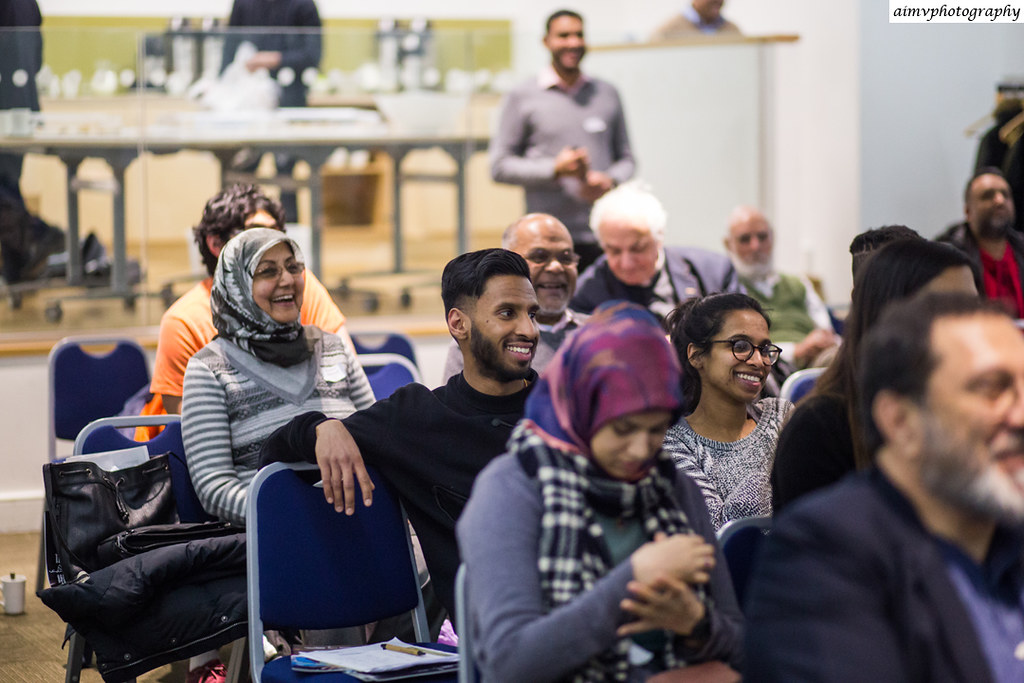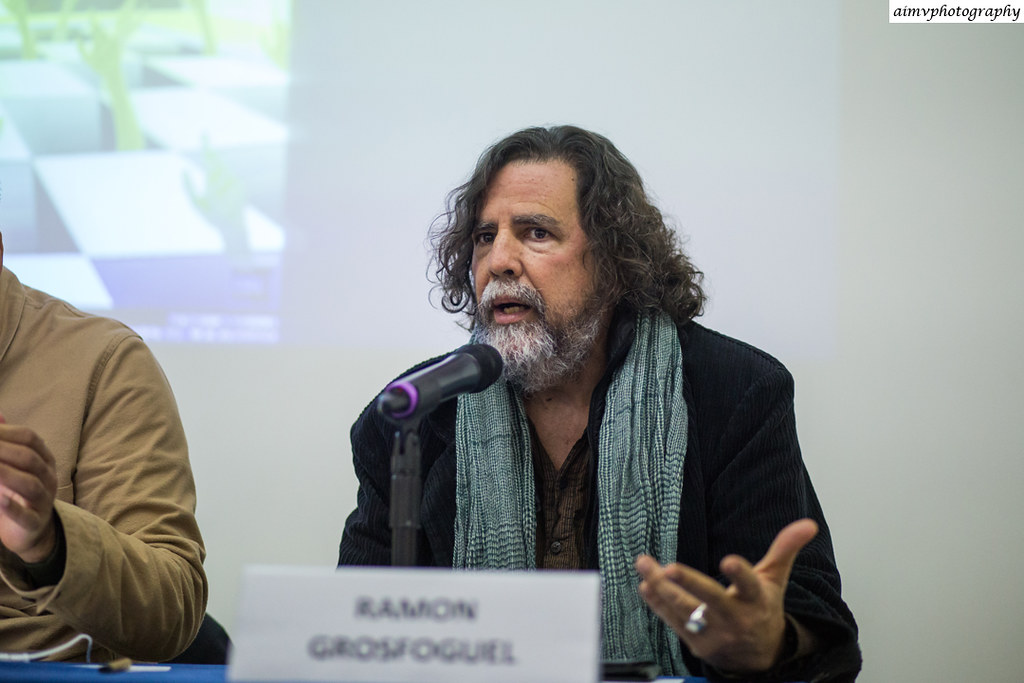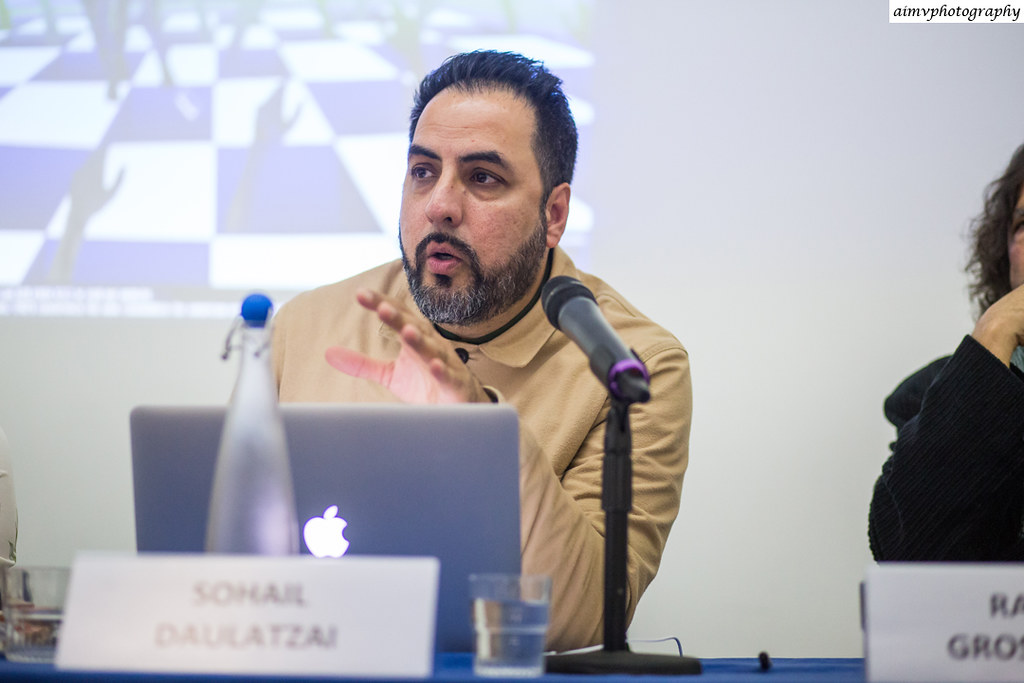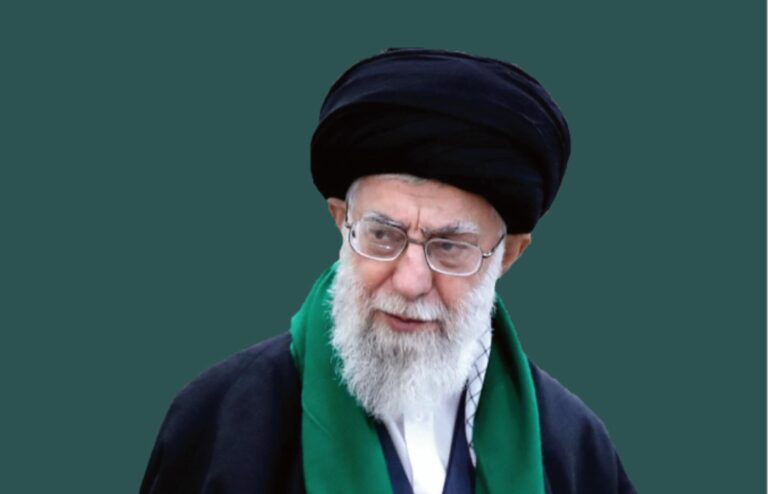Find out more about this unique and timely conference from the following report, including links to all the videos and photos from the event.
You can find an album of photos from the day which can be used under Creative Commons licence 2.0 on Flickr and at the end of the page. You can watch all the videos on IHRCTv on Youtube, or below.
Held at the prestigious Friends House in Euston, Saturday 10 February 2018 saw the gathering of speakers from all over the world to participate in a conference on American exceptionalism and human rights – the first of its kind. The objective of The New Colonialism: The American Model of Human Rights was to unmask the more systemic problems that undergird US Exceptionalism. In particular, the focus was on the Americanisation of Human Rights, and the praxis of human rights, arguing that they have become a tool of US led foreign policy rather than a transformative discourse that seeks to liberate individuals, groups and large sections of society who are oppressed by unjust systems.
With delectable Danish pastries and coffee in the morning, the conference commenced with a melodious recitation and translation of verses 7 to 9 of Surah Al-Maeda, followed by a warm welcome by IHRC Chair, Massoud Shadjareh. Shadjareh provided a brief introduction of what to expect from the panels: ‘[We will] look at the whole concept of human rights and the ways that human rights have unfortunately become an instrument of colonialism and oppression, rather than actually something that preserves justice and rights of human beings’.
With delectable Danish pastries and coffee in the morning, the conference commenced with a melodious recitation and translation of verses 7 to 9 of Surah Al-Maeda, followed by a warm welcome by IHRC Chair, Massoud Shadjareh. Shadjareh provided a brief introduction of what to expect from the panels: ‘[We will] look at the whole concept of human rights and the ways that human rights have unfortunately become an instrument of colonialism and oppression, rather than actually something that preserves justice and rights of human beings’.
The first panel was chaired by Arzu Merali, Head of Research at IHRC. Merali was one of the key organisers of this conference and co-authored Once Upon a Hatred: Anti-Muslim Experiences in the USA (a report analysing statistical evidence on Islamophobia in California), with Ebrahim Mohseni Ahooei and Professor Saied R. Ameli, who was first to speak. Professor Ameli from the University of Tehran, Iran, discussed the USA’s systematic domination through the internet and the demonisation of human rights, not only in the physical space but also in the visual space.
Next to speak was Mary Ryan, a doctoral candidate and teacher in Global Ethics at Virginia Tech University, USA. Ryan discussed the Kerner Commission and some of its key recommendations, and domination and the ways that complicity and domination go hand in hand to perpetuate white supremacy as a moral code within the US government. Next to speak was Sandew Hira, the founder of the Institute for Scientific Research and leader of the project, Decolonizing the Mind which looks into the question of how science has been influenced by colonialism. Hira analysed a theoretical approach of human rights, based on developing a third narrative of liberation. He explained that the other two narratives are rooted in western enlightenment: liberalism and Marxism. The decolonial movement is trying to approach these narratives critically, which has given rise to alternative concepts of reality.
Laurens de Rooij is a post-doctoral research fellow from the University of Cape Town, where his current research analyses how the media discourse on minorities (particularly Muslims and Islam) affects how they are conceptualized, understood, and treated. At the conference he explained the way anti-Muslim sentiments and human rights discourses go hand in hand in American media discourses. He also discussed how human rights discourses in the USA, and most other countries, have a specific understanding of how religion is supposed to function in public. Furthermore, he mentioned the reporting of news, and specifically Muslim-related news, steeped in biases and stereotypes in the media.
The final speaker to present on the panel was Saeed A Khan, a Senior Lecturer Near East & Asian and Global Studies at Wayne State University. Khan’s discussion focused on the weaponisation of water. He cited that the Swiss conglomerate Nestlé is the largest producer of bottled water, and its chairman Peter Brabeck-Letmathe, suggested in 2005 that water is not a human right and that it should be privatised. Mentioning Flint water crisis in Michigan, Khan said the entire tragedy need not have occurred had the government not been so fixed on economics. In addition, he emphasised that the commodification and privatisation of water especially for those who are most in need of it, is a sad reality.
Following the panel one was a Q&A session with the audience and those that were tuned in online. Friends House then served a beautiful vegetarian and seafood lunch, consisting of scrumptious sandwiches, arancini, sausage rolls, brownies, fruits and biscuits.
The second panel was chaired by Nargess Moballeghi. First to speak was Ramon Grosfoguel, a professor in the Department of Ethnic Studies at the University of California at Berkeley. Grosfoguel talked about the linking of the regime of human rights as it is practiced today by international institutions and western imperial countries, with the history of colonialism. He discussed how the inception of the term human rights is one of corruption, as it was created by a racist regime that judged ‘who is human and who is not a human’.
Next to speak was Sohail Daulatzai, a writer, curator and professor. Daulatzai opened his presentation by talking about the film The Battle of the Algiers, a seminal film in the era of decolonisation, and explained how its pivotal history and afterlife becomes an interesting way to talk about the questions in his presentation. He mainly asks the question, how, in the context of the war on terror, has the language and logic of anti-terrorism been used as a racialising discourse but also within the regime of human rights. He explored what the figure of terrorism or terrorist does to our understanding of the human, of whiteness and even the conception of the rights we possess, because when we talk about rights, civil and human rights, certain individuals are excluded from being rights bearing, meaning that some people do not have the capacity to bear rights. Daulatzai then continued that Muslims are deemed threats to the human community, and so they are then deemed killable as the sovereign state has an obligation to protect its citizens; consequently the state must kill that which threatens the rights of the human community.
Tasneem Chopra is a cross-cultural consultant from Australia, where she speaks across the private and public sector to issues of cultural competence, gender, leadership and intersectional discrimination. Chopra’s presentation focused on the Americanisation of detainees in Australia and the irony of Guantanamo Bay being purported as a symbol of the defence of human rights.
The last speaker of the day was Rajeesh Kumar, an Associate Fellow at the Institute for defence Studies and Analyses in New Delhi. Kumar discussed by what means American exceptionalism is the belief that America is a uniquely different country with its own unique destiny and that there is a national consensus in the USA that American global leadership is important and necessary because of its unique history and ‘contributions’.
The day ended with more tea, coffee and scones, a Q&A discussion and concluding comments by IHRC Chair, Massoud Shadjareh. The publication of the papers of the conference is expected in April 2019. Watch this space for more information.
